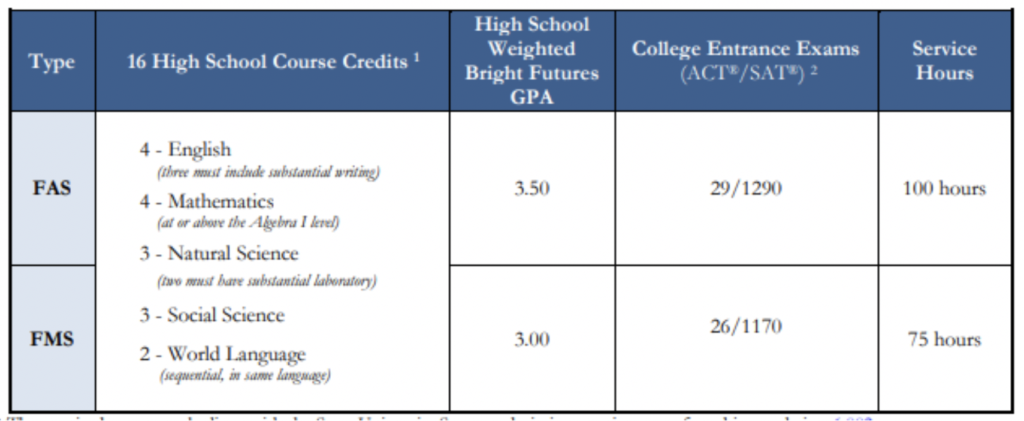The Florida Bright Futures Scholarship Just Got More Difficult
By: Belinda Gonzalez-Leon, Ed. D., MBA
Premier Educational Consulting, LLC
Ph: (305) 494-9389
“The Florida Bright Futures Scholarship Program establishes lottery-funded scholarships to reward Florida high school graduates for high academic achievement.” (https://www.floridastudentfinancialaidsg.org/SAPBFMAIN/SAPBFMAIN)
The Florida Bright Futures Scholarship program offers an incredible opportunity for Florida students who decide to attend Florida public colleges to attend college with almost all costs paid for. However, the test score benchmarks to qualify for this state scholarship are being raised and many believe making it a more difficult scholarship to obtain.
This has prompted critics to question how low-income students, that do not have access to quality resources for test preparation or whose schools may not offer sufficient AP (Advanced Placement) courses, how do these needy students reach test scores and GPAs (Grade Point Averages) to receive a Bright Futures Scholarship?
To qualify for the Bright Futures Scholarship, there are some general residency and high school requirements that must be met. The student must also meet specific SAT (Scholastic Aptitude Test) or ACT (American College Testing) test scores; weighted GPA; and volunteer hours. The current benchmarks are as follows:

(Taken from https://www.floridastudentfinancialaidsg.org/PDF/BFHandbookChapter1.pdf)
During the most recent Florida Legislature session, Senate Bill 190 passed which raised the needed SAT scores for the Florida Bright Futures scholarships for students who graduate in 2021 and after. The FAS (Florida Academic Scholar) scholarship will require a SAT score of 1330 and the FMS (Florida Medallion Scholars) scholarship will require a SAT of 1200.
These scores not truly final because the Department of Education needs to establish new national averages based on scores achieved by students nationwide. Therefore, the proposed SAT scores are not final but an estimate. The ACT scores were not affected, only SAT, because in 2016 the SAT was revised to no longer penalize students for wrong answers whereas the ACT has not made any changes to their test.

Miami-Dade County Public Schools Superintendent Alberto Carvalho was among one of the first critics of this change stating that this would disproportionally affect low-income and minority students in our county. Based on data from the Miami-Dade County School Districts and the Florida Board of Governors, as reported by the Tampa Bay Times, there would be 770 students in Miami Dade County who would lose FAS eligibility if the new standards were enacted today.
“Sixty-three percent of black students and 46 percent of Hispanic students who currently qualify for that scholarship would lose eligibility (https://www.tampabay.com/florida-politics/2019/04/23/bright-futures-standards-could-rise-hurting-students-of-color-again/).” Only 40% of white students (still a large portion) would lose eligibility. Even though many students would drop from the 100% coverage to only 75% coverage, in Miami Dade County it is estimated that over 1200 students would lose eligibility for all Bright Future Scholarship monies.
The FAS Scholarship covers full tuition and fees at Florida state universities and colleges and the FMS Scholarship covers 75% of tuition and fees. As an Educational Consultant, I am a personal witness to students who take the SAT multiple times desperately trying to reach the needed benchmark to be awarded the scholarship because it represents the only way they can attend college.
A parent recently told me that his daughter missed achieving the full-tuition scholarship by 10 points and that he had to counsel his daughter to not stress out, that the family would find a way to cover the remaining 25% of tuition – that it wasn’t worth the anxiety.
As the controversy continues with many opposing the change and others defending it because the purpose of the scholarship is to reward high academic achieving students and therefore it is necessary to meet the national score averages, the fact remains that the legislation has passed. High school students will have to work on raising their SAT scores if they are to graduate in 2021 or after if they want to take advantage of the scholarship.
That means that for students who want to finish test taking in their junior year of high school (2020), the need to hit proposed benchmarks is immediate. Students will need to reach the higher scores or rely on other means of financial aid to attend Florida public colleges and universities. Let the studying begin!

